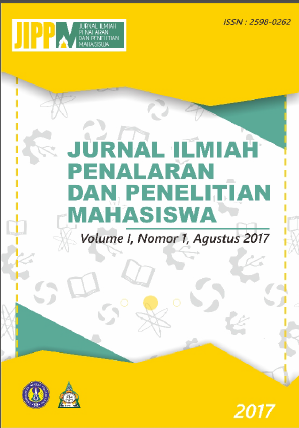STUDY PROGRAM WITH HUMANISTIC THEORY (SAHUT): PROGRAM BIMBINGAN DENGAN TEORI HUMANISTIK UNTUK MENINGKATKAN MOTIVASI BELAJAR ANAK-ANAK DI PERKAMPUNGAN CODE, YOGYAKARTA
Main Article Content
Abstract
Education is like an experiment that never end at any time, as long as there is human life in this world. Education is part of a growing culture and civilization. As in Indonesia, education is something that is absolutely necessary for the progress of civilization. Ironically, education in Indonesia is still a dilemma with problematics. One concrete example of the problematics of education in Indonesia is the phenomenon that occurs in the Code Village, Yogyakarta. Residents living around the Code River are people with low levels of education. According to the data from Kota Baru Village in January 2017, only 2 people continue to S1 and 3 people continue to Diploma level. This is because public awareness of education is still lacking. Children's learning motivation is still very low. The author offers a solution to overcome this problem, namely the Study Program with Humanistic Theory (SAHUT). This research method uses literature review and qualitative analysis of social phenomenon that is happening. This program is intended to improve children's learning motivation in Code Village, Yogyakarta through humanistic learning theory. This theory prioritizes learning by "humanizing human beings". This program is focused on children living in Code Village. This is because the children is the next generation of the nation, so the learning since childhood becomes a very important thing. The first step is making a fun conditions for children. Learning not only with lectures, but can be interspersed with fun games. Through the hypothesis that the authors offer, is expected to be a strategic step to improve children's learning motivation in Code Village, Yogyakarta.
Article Details
References
Djamarah, Syaiful Bahri. 2005. Strategi Belajar Mengajar. Jakarta: Rineka Cipta.
Gagne, Robert & Leislie Briggs. 1979. Principle of Instructional Designs. New York: Rinehart and Winston.
Hasbullah. 2009. Dasar-dasar Ilmu Pendidikan. Jakarta: PT. Raja Grafindo Persada.
Jadaini, Nur. 2014. Pengaruh Bimbingan Belajar terhadap Hasil Belajar Siswa SD Negeri 95/I Desa Olak Kecamatan Muara Bulian. Jambi: Universitas Jambi.
Kartono, Kartini. 1995. Psikologi Anak. Bandung: Mandar Maju.
Khasanah, Neni Uswatun. 2014. Pengaruh Metode Mengajar dan Media Pembelajaran terhadap Motivasi Belajar Siswa Kelas X Program Keahlian Administrasi Perkantoran SMK Negeri 1 Yogyakarta. Yogyakarta: UNY.
Nugroho, Yuli Prasetyo. 2008. Makna Sungai dan Praktek Pengelolaan Lingkungan melalui Pendekatan Budaya (Studi Kasus Masyarakat Sempadan Sungai Code, Kotamadya Yogyakarta). Jakarta: Program Pendidikan Magister (S2) Program Studi Ilmu Lingkungan UI.
Rusmana, Nandang. 2009. Bimbingan dan Konseling di Sekolah (Metode, Teknik, dan Aplikasi).
Bandung: Rizki Press.
Sanusi, Uci. 2013. Pembelajaran dengan Pendekatan Humanistik (Penelitian pada MTs Negeri Model Cigugur Kuningan. Jurnal Pendidikan Agama Islam-Ta’lim, Volume 11 No.2 2013.
Sardiman A.M. 2006. Interaksi dan Motivasi Belajar Mengajar. Jakarta: PT Raja Grafindo Persada.
Slameto. 2010. Belajar dan Faktor-faktor yang Mempengaruhinya. Jakarta: Rineka Cipta.
Sukmadinata, Nana Syaodih. 2004. Landasan Psikologis Proses Pendidikan. Bandung: PT Remaja Rosdakarya.
Suparman, S. 2010. Gaya Mengajar yang Menyenangkan Siswa. Yoyakarta: Pinus Book Publisher.
Uno, Hamzah. 2006. Orientasi Baru Dalam Psikologi Perkembangan. Jakarta: Bumi Aksara.
Yusuf, Syamsu & Juntika Nurihsan. 2005. Landasan Bimbingan dan Konseling. Bandung: Remaja Rosdakarya.

